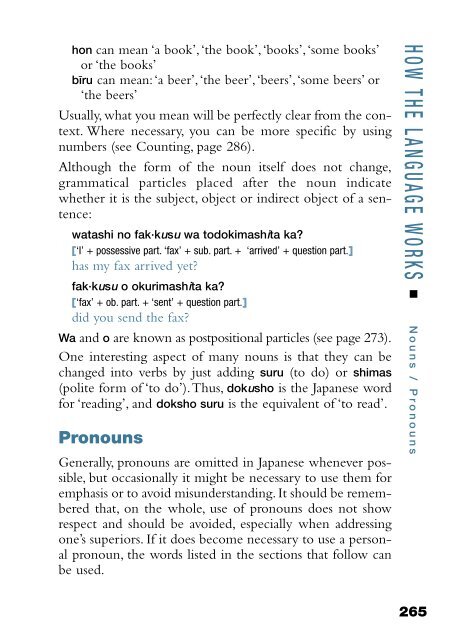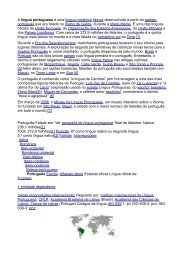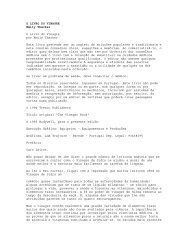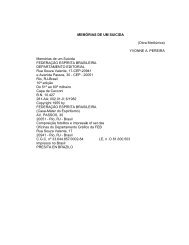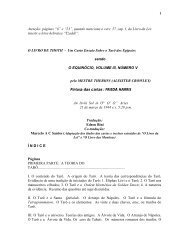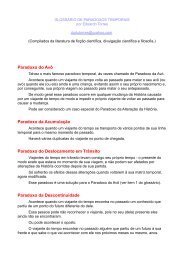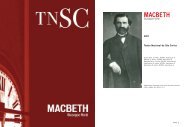- Page 3 and 4:
t h e R o u g h g u i d e<br />japa
- Page 5:
contents<br />Introduction 5<br />B
- Page 9 and 10:
Basic<br />Phrases
- Page 11:
no, thank you<br />ie kek·ko desu<
- Page 15 and 16:
1. Accommodation<br />is there an i
- Page 17 and 18:
3. Booking a room<br />shower shaw
- Page 19 and 20:
5. Communications<br />ADSL modem A
- Page 21 and 22:
7. Emergencies<br />accident<br />j
- Page 23 and 24:
9. Health<br />I’m not feeling ve
- Page 25 and 26:
11. Meeting people<br />hello<br />
- Page 27 and 28:
13. Restaurants<br />bill kanjō ga
- Page 29 and 30:
15. Sightseeing<br />art gallery bi
- Page 31:
English<br />➜<br />Japanese
- Page 34 and 35:
English ➜ Japanese<br />ABCDEFGHI
- Page 36 and 37:
English ➜ Japanese<br />ABCDEFGHI
- Page 38 and 39:
English ➜ Japanese<br />ABCDEFGHI
- Page 40 and 41:
English ➜ Japanese<br />ABCDEFGHI
- Page 42 and 43:
English ➜ Japanese<br />ABCDEFGHI
- Page 44 and 45:
English ➜ Japanese<br />ABCDEFGHI
- Page 46 and 47:
English ➜ Japanese<br />ABCDEFGHI
- Page 48 and 49:
English ➜ Japanese<br />ABCDEFGHI
- Page 50 and 51:
English ➜ Japanese<br />ABCDEFGHI
- Page 52 and 53:
English ➜ Japanese<br />ABCDEFGHI
- Page 54 and 55:
English ➜ Japanese<br />ABCDEFGHI
- Page 56 and 57:
English ➜ Japanese<br />ABCDEFGHI
- Page 58 and 59:
English ➜ Japanese<br />ABCDEFGHI
- Page 60 and 61:
English ➜ Japanese<br />ABCDEFGHI
- Page 62 and 63:
English ➜ Japanese<br />ABCDEFGHI
- Page 64 and 65:
English ➜ Japanese<br />ABCDEFGHI
- Page 66 and 67:
English ➜ Japanese<br />ABCDEFGHI
- Page 68 and 69:
English ➜ Japanese<br />ABCDEFGHI
- Page 70 and 71:
English ➜ Japanese<br />ABCDEFGHI
- Page 72 and 73:
English ➜ Japanese<br />ABCDEFGHI
- Page 74 and 75:
English ➜ Japanese<br />ABCDEFGHI
- Page 76 and 77:
English ➜ Japanese<br />ABCDEFGHI
- Page 78 and 79:
English ➜ Japanese<br />ABCDEFGHI
- Page 80 and 81:
English ➜ Japanese<br />ABCDEFGHI
- Page 82 and 83:
English ➜ Japanese<br />ABCDEFGHI
- Page 84 and 85:
English ➜ Japanese<br />ABCDEFGHI
- Page 86 and 87:
English ➜ Japanese<br />ABCDEFGHI
- Page 88 and 89:
English ➜ Japanese<br />ABCDEFGHI
- Page 90 and 91:
English ➜ Japanese<br />ABCDEFGHI
- Page 92 and 93:
English ➜ Japanese<br />ABCDEFGHI
- Page 94 and 95:
English ➜ Japanese<br />ABCDEFGHI
- Page 96 and 97:
English ➜ Japanese<br />ABCDEFGHI
- Page 98 and 99:
English ➜ Japanese<br />ABCDEFGHI
- Page 100 and 101:
English ➜ Japanese<br />ABCDEFGHI
- Page 102 and 103:
English ➜ Japanese<br />ABCDEFGHI
- Page 104 and 105:
English ➜ Japanese<br />ABCDEFGHI
- Page 106 and 107:
English ➜ Japanese<br />ABCDEFGHI
- Page 108 and 109:
English ➜ Japanese<br />ABCDEFGHI
- Page 110 and 111:
English ➜ Japanese<br />ABCDEFGHI
- Page 112 and 113:
English ➜ Japanese<br />ABCDEFGHI
- Page 114 and 115:
English ➜ Japanese<br />ABCDEFGHI
- Page 116 and 117:
English ➜ Japanese<br />ABCDEFGHI
- Page 118 and 119:
English ➜ Japanese<br />ABCDEFGHI
- Page 120 and 121:
English ➜ Japanese<br />ABCDEFGHI
- Page 122 and 123:
English ➜ Japanese<br />ABCDEFGHI
- Page 124 and 125:
English ➜ Japanese<br />ABCDEFGHI
- Page 126 and 127:
English ➜ Japanese<br />ABCDEFGHI
- Page 128 and 129:
English ➜ Japanese<br />ABCDEFGHI
- Page 130 and 131:
English ➜ Japanese<br />ABCDEFGHI
- Page 132 and 133:
English ➜ Japanese<br />ABCDEFGHI
- Page 134 and 135:
English ➜ Japanese<br />ABCDEFGHI
- Page 136 and 137:
English ➜ Japanese<br />ABCDEFGHI
- Page 138 and 139:
English ➜ Japanese<br />ABCDEFGHI
- Page 140 and 141:
English ➜ Japanese<br />ABCDEFGHI
- Page 142 and 143:
English ➜ Japanese<br />ABCDEFGHI
- Page 144 and 145:
English ➜ Japanese<br />ABCDEFGHI
- Page 146 and 147:
English ➜ Japanese<br />ABCDEFGHI
- Page 148 and 149:
English ➜ Japanese<br />ABCDEFGHI
- Page 150 and 151:
English ➜ Japanese<br />ABCDEFGHI
- Page 152 and 153:
English ➜ Japanese<br />ABCDEFGHI
- Page 154 and 155:
English ➜ Japanese<br />ABCDEFGHI
- Page 156 and 157:
English ➜ Japanese<br />ABCDEFGHI
- Page 158 and 159:
English ➜ Japanese<br />ABCDEFGHI
- Page 160 and 161:
English ➜ Japanese<br />ABCDEFGHI
- Page 162 and 163:
English ➜ Japanese<br />ABCDEFGHI
- Page 164 and 165:
English ➜ Japanese<br />ABCDEFGHI
- Page 166 and 167:
English ➜ Japanese<br />ABCDEFGHI
- Page 168 and 169:
English ➜ Japanese<br />ABCDEFGHI
- Page 170 and 171:
English ➜ Japanese<br />ABCDEFGHI
- Page 172 and 173:
English ➜ Japanese<br />ABCDEFGHI
- Page 174 and 175:
English ➜ Japanese<br />ABCDEFGHI
- Page 176 and 177:
English ➜ Japanese<br />ABCDEFGHI
- Page 179 and 180:
Japanese<br />➜<br />English
- Page 181 and 182:
A<br />abek·ku lovers, a couple<br
- Page 183 and 184:
yoki illness; disease<br />byoki (n
- Page 185 and 186:
dochira which; who<br />dochira dem
- Page 187 and 188:
Getsuyobi Monday<br />gezai laxativ
- Page 189 and 190:
(instrument)<br />hikinobashi enlar
- Page 191 and 192:
isha doctor<br />ishi stone, rock<b
- Page 193 and 194:
mation office<br />Kankoku South Ko
- Page 195 and 196:
kisu kiss<br />kishibe shore (of la
- Page 197 and 198:
(money)<br />kyaku customer<br />ky
- Page 199 and 200:
modot·te ikimasu to go back<br />m
- Page 201 and 202:
nishukan fortnight<br />ni-to secon
- Page 203 and 204:
osugimasu that is too much<br />osu
- Page 205 and 206:
kins/towels<br />seishiki (na) form
- Page 207 and 208:
shomeisho certificate<br />shonin w
- Page 209 and 210:
tansha moped<br />taoru flannel; to
- Page 211 and 212:
ue ni up<br />ugokashimasu to move<
- Page 213:
Z<br />zabuton floor cushion<br />z
- Page 216 and 217:
Japanese ➜ English: Signs and Not
- Page 218 and 219: Japanese ➜ English: Signs and Not
- Page 220 and 221: Japanese ➜ English: Signs and Not
- Page 222 and 223: Japanese ➜ English: Signs and Not
- Page 224 and 225: Japanese ➜ English: Signs and Not
- Page 226 and 227: Japanese ➜ English: Signs and Not
- Page 228 and 229: Japanese ➜ English: Signs and Not
- Page 230 and 231: Japanese ➜ English: Signs and Not
- Page 232 and 233: Japanese ➜ English: Signs and Not
- Page 234 and 235: Japanese ➜ English: Signs and Not
- Page 237: Menu<br />Reader:<br />Food
- Page 240 and 241: Menu Reader: Food<br />238<br />Ess
- Page 242 and 243: Menu Reader: Food<br />240<br />Bee
- Page 244 and 245: Menu Reader: Food<br />242<br />=>?
- Page 246 and 247: Menu Reader: Food<br />244<br />tam
- Page 248 and 249: Menu Reader: Food<br />246<br />Fru
- Page 250 and 251: Menu Reader: Food<br />248<br />thi
- Page 252 and 253: Menu Reader: Food<br />250<br />wit
- Page 254 and 255: Menu Reader: Food<br />252<br />pic
- Page 256 and 257: Menu Reader: Food<br />254<br />Æ
- Page 259 and 260: Contents<br />Essential Terms . . .
- Page 261 and 262: Beer, Spirits,<br />Wine etc<br />
- Page 264: How the<br />Language<br />Works
- Page 267: HOW THE LANGUAGE WORKS<br />■ Gen
- Page 271 and 272: HOW THE LANGUAGE WORKS<br />■ Pro
- Page 273 and 274: HOW THE LANGUAGE WORKS<br />■ Pos
- Page 275 and 276: HOW THE LANGUAGE WORKS<br />■ Pos
- Page 277 and 278: HOW THE LANGUAGE WORKS<br />■ Pos
- Page 279 and 280: HOW THE LANGUAGE WORKS<br />■ Ver
- Page 281 and 282: HOW THE LANGUAGE WORKS<br />■ Ver
- Page 283 and 284: HOW THE LANGUAGE WORKS<br />■ Adj
- Page 285 and 286: HOW THE LANGUAGE WORKS<br />■ Adj
- Page 287 and 288: HOW THE LANGUAGE WORKS<br />■ ‘
- Page 289 and 290: HOW THE LANGUAGE WORKS<br />■ Cou
- Page 291 and 292: HOW THE LANGUAGE WORKS<br />■ Dat
- Page 293 and 294: HOW THE LANGUAGE WORKS<br />■ Day
- Page 295 and 296: HOW THE LANGUAGE WORKS<br />■ Num
- Page 297: HOW THE LANGUAGE WORKS<br />■ Con


